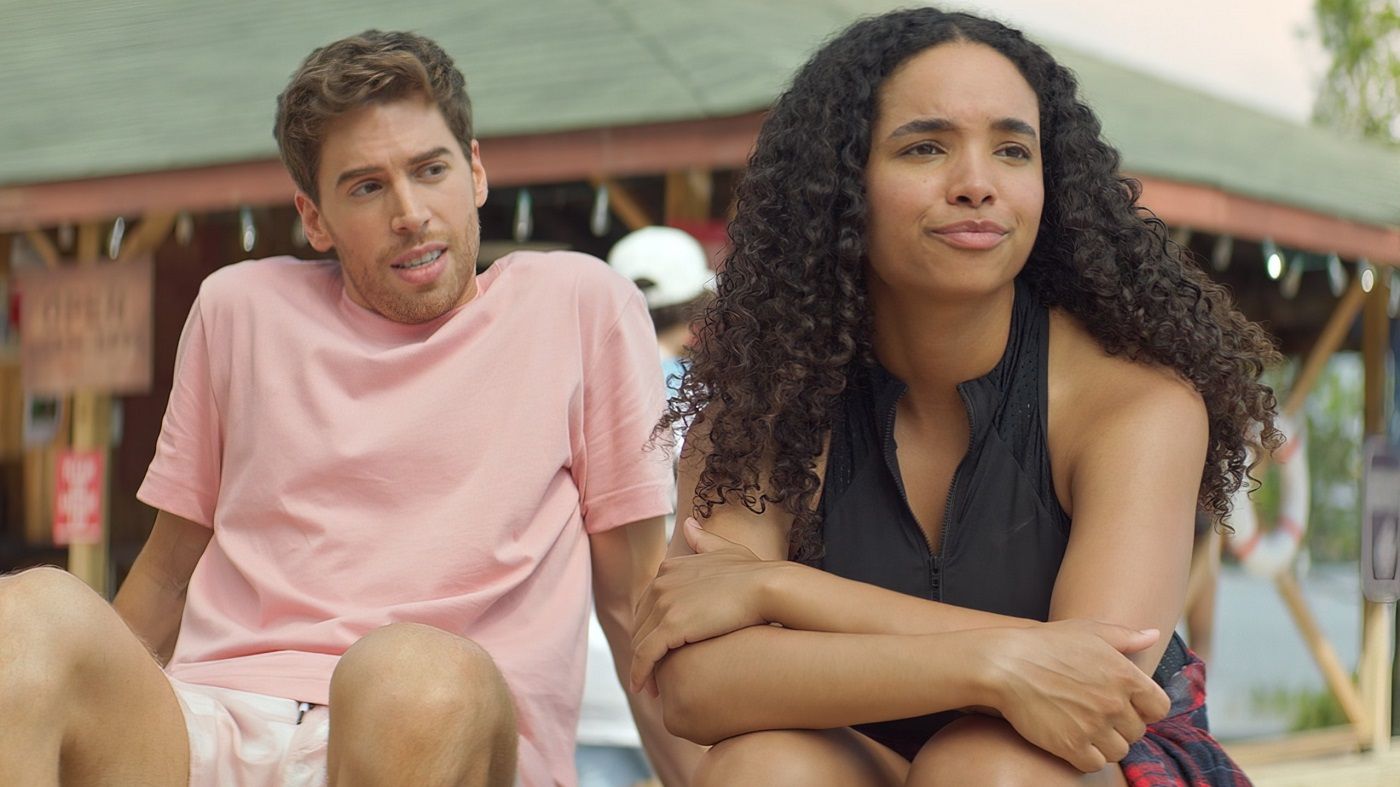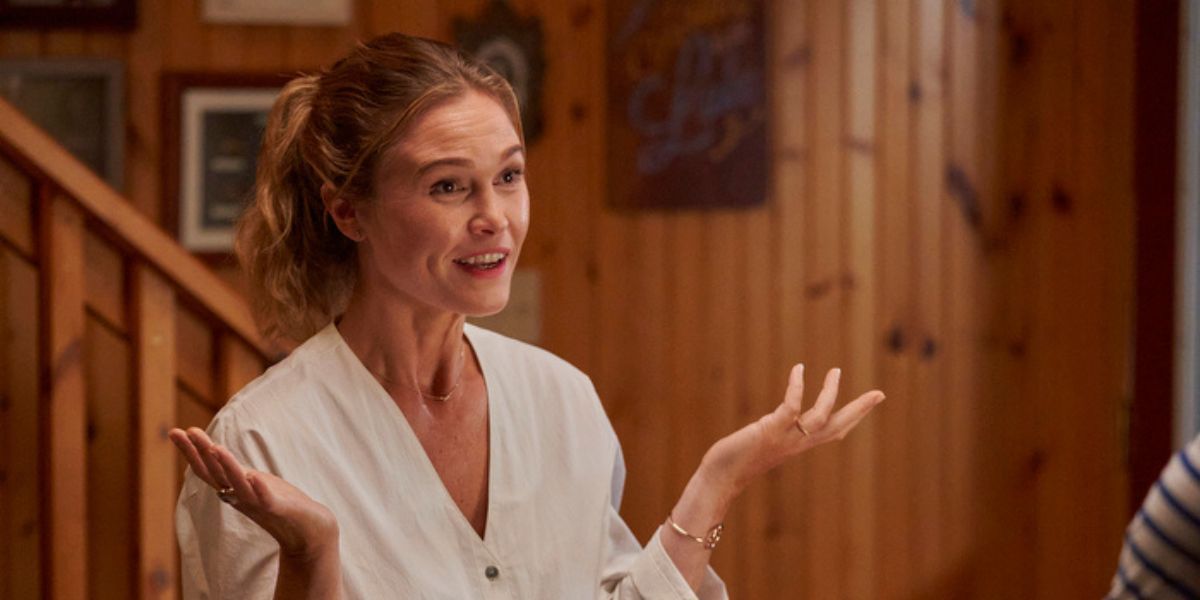In form and style, Prime Video's Pride season release The Lake is a rightful heir to the modern family serial dramedy. It successfully navigates and evolves general audience appeal with self-aware camp representation of lived intersectionalities, transparently playing with ideas of the power of language, identity, heritage and so much more.
At the center of the series stands the developing relationship between birth parent Justin (Jordan Gavaris) and his now teenage daughter, Billie (Madison Shamoun), who was happily adopted. A high-achieving student, Billie is spending the summer with her gay birth father adjacent to the family’s contested vacation property. Billie’s summer coming-of-age journey is symbolized by her engagement with the water through the eight episodes, arcing from fear and self-doubt, to bold engagement, acclimation, and eventual joy.
Meanwhile, Justin evolves from a version of the family clown, shifting the long-held media trope of an irresponsible, frivolous gay character, by becoming an engaged shaper of narrative and role model in an "it takes a village" approach to growing up, and both literal and cultural reproduction.
As the primary protagonists, Justin and Billie stand in for the audience as the series’ emotional point of view. The first reveal of their unexpected extended kin is complicated by the sensuous emergence two hard-bodied swimmers at the family’s dock, objects of a lustful lens. Retired hockey star Victor (Terry Chen) and son Killian (Jared Scott) are engaged in their own pursuit of elite physicality, and their characters will serve to direct attention to unrealistic aesthetic standards, as well as the pressure to achieve peak performance, which is experienced by athletes — especially those whose intersectionality may have been a social barrier to success. Though it is true that Billie and Killian have a non-biological grandfather in common, these two also experience being part of an extended family legacy, which gives the impression of an exclusively-until-recently white ancestry, and being visibly not-entirely-white themselves. Billie’s upbringing by her Black Canadian adoptive parents (Lisa Codrington, Milton Barnes) means that the two have never met — and their "will-they-won’t-they" sexual tension is safely explored in a manner very fitting in a series blatantly queering the genre.
Water plays its symbolic part in numerous narrative-shaping moments throughout the eight episode run. The physical lake serves as metaphor for society at large (i.e., the cultural climate) and environmental climate change is also directly referenced as one of Billie’s central personal concerns. Like the series itself, the water doesn’t need to be excessively deep to act as a site of contestation, the space where fears lurk and are confronted, control is negotiated, and diversity is ultimately celebrated. Despite being an accomplished swimmer in the controlled environment of a pool, Billie is trepidatious about stepping out of control into the unpredictable and murky water. Killian trains for a lifeguard position, which though deemed desirable by virtue of its cultural cache, doesn't really interest him. In overly-dramatic fashion, the canoe-based sport of tilting becomes a means of argument-settling and to the winner, so too is awarded a gain in social capital.
Embattled in familiar tropes of rivalry, secrets, and inheritance, intersectional and modernizing families are directly symbolized by the architecture of the lakefront cottages. It is revealed that Justin’s beloved former childhood summer home has not, in fact, been sold to strangers but has been claimed as inheritance by his half-sister, Maisy-May (Julia Stiles), and renovated nearly beyond recognition. Justin secretly schemes to divest Maisy of this ill-gotten asset, maintaining a conflicting vision for the future of the site and by extension, the family identity.
Prolific benefactors of reproductive technology, parents of quadruplets Jayne (Natalie Lisinska) and Wayne (Jon Dore) extend the wider circle of immature adults. Leaning into their roles as parents of independence-seeking teens while competing for sway over the changing character of the community, by way of petty politics and power plays over proposed additional construction on their own existing vacation property, the two make a fine foil against which both Maisy’s conservatism and Justin’s drama can shine.
The third cottage, an outdated rental, is rife with potential for a makeover. For economic reasons, it is the seasonal stopping place for Justin and Billie, and they make the best of it in parallel with their growing relationship. As neither the small structure, nor their bond, has been subject to modern updates, it is fitting that it takes the course of the summer for either to demonstrate a willingness to commit fully to it; though when in conflict, Billie will assert independence and temporarily evict Justin while hosting her visiting birth mother Teesa (Sagine Sémajuste). In a tease for a future season, neither Maisy nor Justin will achieve an exclusive right to any of the lakefront abodes; just as in real kinship networks, to define belonging and inhabit these spaces is complicated, collaborative, and requires compromise.
The penultimate blending of Justin and Maisy’s family lineage is embodied by fierce creative force Opal (Declan Whaley), whose youth is harmonized with an ageless sensibility for drag-informed style, art, and personal confidence. Opal’s relationship with the lake is one of removed disinterest, observance, and commentary, and mirrors their disengagement with the aquatic shenanigans of the older relations.
The series is rife with self-aware references to queerly quintessential millennial cinematic favorites like Mean Girls (cue the Plastics and their edgy outsider fourth, a three-stage scheme for bringing about a rival’s downfall) and Cabin in the Woods (in a special horror movie spoof episode). In subject and style, The Lake inherits significantly from Canadian cult classic television series like Degrassi (in its plethora of iterations) and contemporary Canadian Broadcasting Company (CBC) original series Moonshine. It smacks of north-of-the-49th comedy flavor.
Combined with its positive depictions of safe psychedelic use, Justin's direct and self-effacing admission to gay appropriations of Black culture, representations of fluid and evolving concepts of gender, sexuality, and ethnicity, The Lake is neither especially risk-taking nor stagnant in its themes and form. By employing contemporary and evergreen genre conventions, this first run achieves approachability and, much like summer weeks set aside for simply taking a refreshing break, evokes its own hope, without promise, of return.




